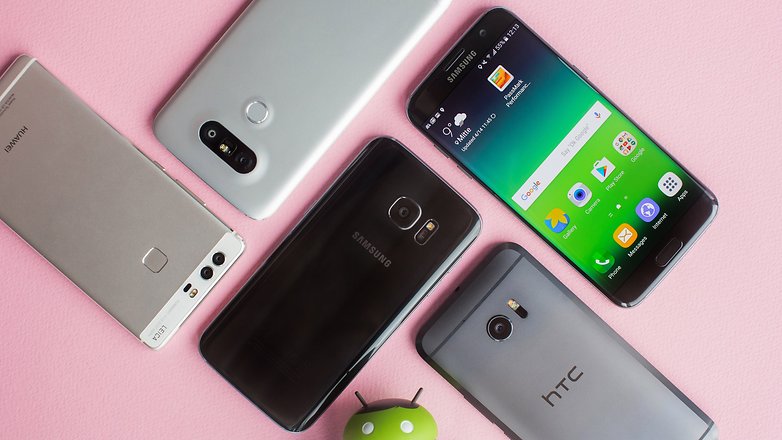All of the players in the smartphone market have the same common goal, namely, to get rich and get big. Some brands like Facebook and Google also have more philanthropic goals: worldwide internet access, immortality, ending poverty and sickness, etc.
Due to a lack of means, a lot of companies today don’t set their sights high enough and end up settling for the commercialization of smartphones. The problem is that clever Google wages war on a number of fronts, particularly in the fabrication and the commercialization of smartphones. Google doesn’t want to share its cake with the other brands. Samsung and Huawei have settled on a simpler solution: because it’s every man for himself, they’ve created their own operating systems.

What’s Google’s battle plan?
Before getting too deep in the trenches, let’s remember that Google plays a major role in Android’s operating system. This system is made up of two elements: on the one hand, you have the AOSP, which makes up Android’s base. It’s a functional system with a few extremely basic applications. On the other hand, we have different Google elements (so, not free), made available by the companies so that they are implemented on the smartphones.
Google is more influential than it seems. AOSP (Android Open Source Project) is obviously an open source project, but it’s controlled by – that’s right – Google. It doesn’t belong exclusively to Google, but that doesn’t stop the giant from playing master puppeteer. In other words, the American company wants to do more than just add a “Google layer” to Nexus and Pixel, it wants to control a significant part of Android’s development.

Google is more influential than it seems
That said, Google also makes an appearance on other fronts in the smartphone market. Apart from just the software, Google shows up in the hardware on Pixel and Nexus devices. Until now, Nexus has been linked to collaborations with another brand: the 6P was made with Huawei, for example, and the 5X with LG, etc. Nexus’s smartphones are changing their names to become a part of Pixel, indicating great changes to come. The brand’s name is about to disappear completely, the phone will use its own high-end programs; the list goes on.
Let’s consider what Google’s long-term goals could be. I have to keep this hypothetical, because I can do little more than postulate on the subject. The only concrete information we have is comprised of PR statements that say everything and nothing at once, but are mostly just pretty words hiding a different story.
Google wants to outplay its competitors. Its handling of the high-end Pixel devices clearly shows that it wants to be treated like any other smartphone brand. Apart from that, if the rumors claiming they could buy back HTC are true, that would simplify a lot of things.
Google never tried to hide that everything would be simpler for the whole world if smartphone makers didn’t have user interfaces. These interfaces cause updates to appear with a delay––if they appear at all. They could also take steps to encourage brands to stay true to Android Stock, all the while gaining an advantage for themselves and developing their own interface based on optimized stock, and personalized according to their tastes.
All of this would be brilliant, if Google manages to pull it off, though it discredits the competitors. Other brands would offer something closely resembling their own basic interface, and then build on it to create one in the Google style, with quick updates and Google exclusive applications and services. It goes without saying that this would upset other phone companies.
How can they win the battle?
Google could independently build their Nexus devices, and a few other builders want to become independent from Google when it comes to the software. What could Google do in this war for independence? There are a few scenarios that could play out. Here are the most interesting ones:
1. Google stops sharing Android
Google’s role in Android is considerable, and if they want to privatize everything, there’s not much standing in their way. The manufacturers would need to hurry to create their own operating systems, likely based on older Android models or on ROM alternatives. This would be a difficult situation for manufacturers with little means. But for the bigger names like Samsung it would be great motivation to speed up the production of their own operating system (Tizen).
This would be a pretty radical step, though. Google would eliminate a few competitors and force the others to speed up their own plans. The other side of the coin is however also not bad; fewer Android users would mean fewer users for Google, which doesn’t necessarily work to their advantage. Is the game really worth the struggle?
2. Google sells Android
Instead of burning bridges with the manufacturers, Google could offer access to the source code by way of finances. Additionally, each manufacturer would need to spend money to gain access to the source code and be able to create their own systems.
This isn’t really a convincing option either, though. Apart from the initial problem (the major risk of losing users), Google is more afraid of their big competitors, like Samsung or Huawei, than they are of the little ones.
3. Google keeps offering Android but limits manufacturers’ power
The two earlier points are definitely possible but highly improbable. It would be most logical for Google to keep on keeping on in order to maintain its number and quality of users. In this case, they should also adopt an opposing strategy and force the makers to stick with Android; that’s to say, they would give up their own OS while minimizing the potential of losing clients. It’s unlikely to see any sort of alliance formed among the manufacturers – especially among the biggest ones – meaning the battle will carry on.
Despite the fragmentation that’s occurred between different versions, Android is still the most used system. What that means practically is that businesses and “simple” developers should consider working for Apple’s App Store or Android’s Play Store if they’re looking to reach almost all users.
If other makers want to break out with their own systems, they’ll need to create a special application for the system, which means lots of money and equal amounts of time, two key aspects for any developer. Another solution would be for the manufacturers to find a way to make Android work on their new systems, eliminating all bugs and delays, of course. They could use an emulation, for example, though it’s lacking in practical functionality.
It wouldn’t be surprising if Google were to put up roadblocks for other manufacturers. Just a while ago there was a lot of talk about “class embarrassment”, which was meant to get manufacturers to speed up the release of their updates. Here, though, Google could use that to turn the tides in their favor.
What do you think Google could do to head off its competitors?
No comments:
Post a Comment